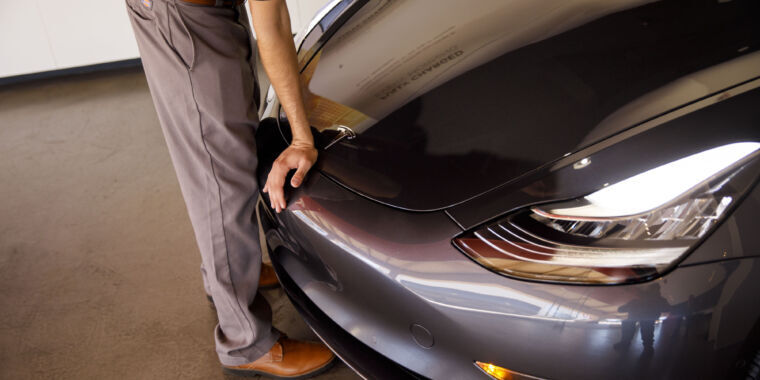The electric car manufacturer Tesla had to issue a massive recall this month to fix faulty hood latches that can open while its cars are driving. The problem affects more than 1.8 million cars, which means it’s slightly smaller than the recall in December that applied to more than 2 million Teslas.
The problem, according to the official National Highway Traffic Safety Administration’s Part 573 safety recall report, affects model year 2021–2024 Model 3s (built between September 21, 2020, and June 2, 2024), model year 2021–2024 Model Ss (built between January 26, 2021, and July 15, 2024), model year 2021–2024 Model Xs (built between August 18, 2021, and July 15, 2024), and model year 2020–2024 Model Ys (built between January 9, 2020, and July 15, 2024).
The problem first became apparent to Tesla in March of this year after complaints about unintended hood opening from Chinese customers. By April, it had identified the problem as deformation of the hood latch switch, “which could prevent the customer from being notified about an open hood state.”
Although the problem is with the hood latch, as with many Tesla safety recalls, the problem can be fixed with an over-the-air software patch. The new software is able to detect if the hood is open and, if so, will display a warning to the driver to alert them to stop their vehicle and secure the hood.



Trying to solve a hardware problem with a software solution. Where have I seen that before?
Boeing lurking in the shadows
Right? It’s deformation of the hood latch. So a physical change. How long until the warning is permanent?
Thought you had made an Intel reference.
Yes, because Boeing is the only time software has attempted to solve a hardware issue…
I too enjoy taking comments out of context so I can criticize them.
How is that taking it out of context? Software is used to fix hardware defects all the time, everywhere. Just because Boeing did it poorly, doesn’t mean it’s inherently dangerous or a bad idea.
They did not state or imply that Boeing was the only company to fix a hardware issue via a software update, nor did they state or imply that doing so is an inherently dangerous or bad idea.
The verifiable context was simply that Boeing, a disreputable company, also attempted to correct a hardware issue with a software update. One might infer that the OP could be suggesting this instance may be bad given Boeing’s failure at doing so combined with Tesla’s dubious reputation due to its association Elon Musk, a demonstrably unethical person, and its record of vehicular build quality issues. Claiming the comment suggests ALL efforts to do so are INHERENTLY bad or dangerous cannot be supported without additional information from the OP, though, so criticisms to that effect rely on pure speculation.
How is Boeings failure related to Tesla, a company known for terrible hardware quality control and amazing software?
You’d have to ask op, we can only guess at anything beyond what they wrote. That’s my entire point.
And my point is that OP did try to imply that using software for that is a bad idea, I can see no other possible explanation.